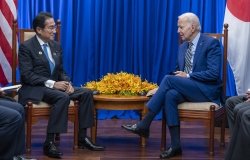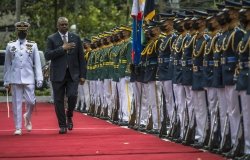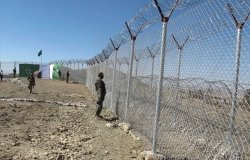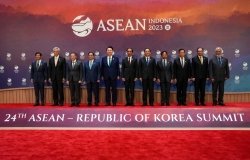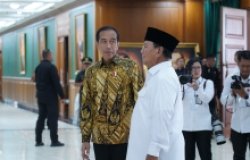
A blog of the Indo-Pacific Program
The UN Doha Meeting: Sustain Aid and Confront Unyielding Taliban Rule
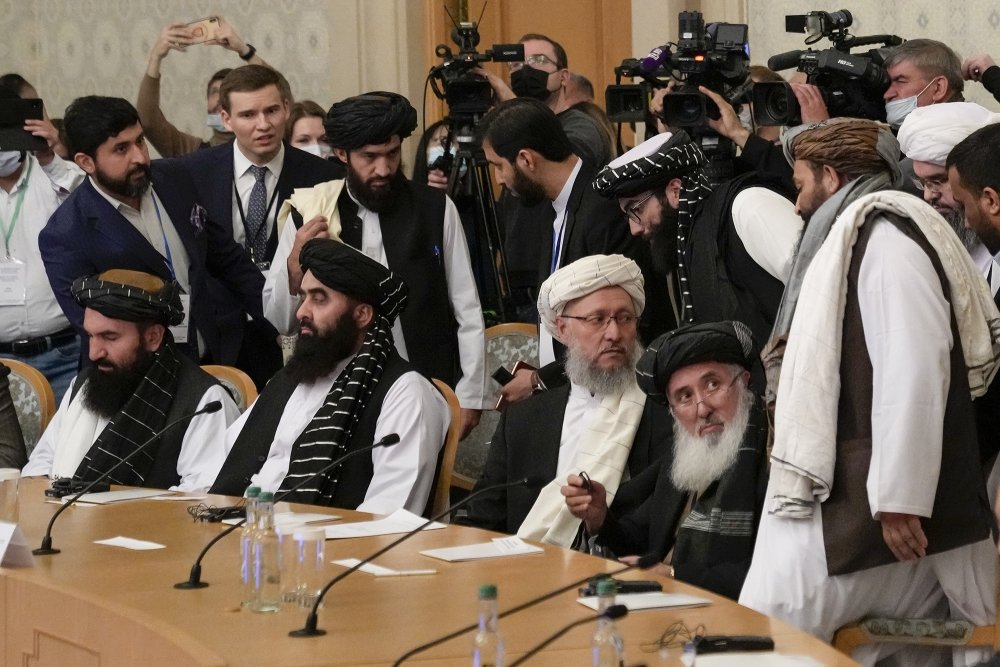
On February 7, 2024, President Biden informed Congress of his decision to extend for a year the national emergency concerning the deepening humanitarian crisis in Afghanistan. This extension ensures that humanitarian aid can continue uninterrupted, despite potential budget disagreements in Congress. While the world's attention is diverted by conflicts in Gaza and Ukraine, the Taliban in Afghanistan have quietly expanded their oppressive regime, showing a blatant disregard for the demands of both Afghans and international partners. Two and a half years after regaining control, the Taliban have solidified their rule into a repressive theocratic dictatorship, under which poverty has reached a staggering high of almost 90%.
The initial belief that international recognition, the lifting of targeted sanctions, the unfreezing of Afghanistan's national bank reserves, and development aid could serve as significant leverage to encourage the Taliban to amend their policies—especially their gender apartheid against women—has proven insufficient to incentivize them to make any compromises.
On February 9, 2024, Sarajuddin Haqqani, the Taliban's acting interior minister, acknowledged at a gathering in Khost province that the international community's recognition of the Taliban regime hinges on it meeting global demands. But he reminded the audience that the Taliban did not expel the U.S. and NATO forces with "sweets and pleasantries," but through force. He suggested that it could take up to 10 years for recognition to be considered, yet he maintained with a triumphant smile that adherence to Taliban core beliefs is paramount and that recognition is not crucial.
The Taliban's perception of legitimacy stems from their prolonged violent fight, rooted in their success in defeating their adversaries to establish what they describe as a state founded on "pure Sharia law." This adherence to their strict interpretation of Islamic principles forms another pillar of their perceived legitimacy. According to their beliefs, the opinions and concerns of the populace are secondary; their governance aims solely to please God. The concepts of rational or democratic legitimacy, as described by theorists like Max Weber and Samuel Huntington, are not compatible with the Taliban worldview.
They also count on a divided region and a distracted international community. Amidst the evolving differences among regional and international stakeholders regarding their future dealings with Afghanistan, the Taliban's de facto foreign minister, reportedly under the advice and encouragement of Mr. Hassan Kazemi Qomi, Iran's Special Envoy to Afghanistan, on January 29 2024, hastily organized a regional cooperation meeting in Kabul, primarily in opposition to Security Council resolution 2721 (2023) that called for creating a new UN special envoy to Afghanistan. In his remarks at the meeting, he asserted that Afghanistan is not in a state of conflict, negating the need for an international contact group, which is also a key recommendation by Mr. Feridun Sinirlioğlu, the UN special coordinator appointed to conduct an assessment of Afghanistan’s challenges and how to address them.
According to several key European and regional diplomats, there is increasing disagreement among international and regional players on how to engage with the Taliban.
According to several key European and regional diplomats, there is increasing disagreement among international and regional players on how to engage with the Taliban. This discord underscores the influence of geopolitical interests and major power rivalries, diverging from the informal global consensus on dealing with the Taliban and their recognition. For instance, President Xi Jinping of China, in a significant gesture on January 30, 2024, accepted the credentials of the Taliban's nominee for ambassador to Beijing during a formal ceremony. Similarly, Iran's special envoy for Afghanistan, Mr. Qomi, portrayed the Taliban as allies within the "axis of resistance."
In this context, a meeting scheduled for February 17 in Doha, convened at the invitation of United Nations Secretary-General Antonio Guterres, represents a potential pivotal moment to forge a principled and unified strategy towards the Taliban. This gathering will bring together over 40 special envoys and representatives from donor countries and regional entities to deliberate on the recommendations from the independent assessment conducted by Sinirlioğlu, the special coordinator.
Leveraging the insights gained over the past two and a half years, the United States and the broader international community must find a balance between the immediate allure of normalization, and principled decisions that prioritize human rights, women's rights, and Afghanistan's long-term stability.
To ensure the Doha meeting yields impactful results, the following recommendations should be considered:
1. Given the absence of any domestic accountability mechanisms for the Taliban, who also expect international recognition and support without addressing global concerns, a strong message needs to be sent. The United Nations Security Council's resolution 2721 (2023) should be enforced promptly. This means that the secretary general should appoint a special envoy immediately, regardless of the Taliban's objections. Considering the human rights crisis, it's crucial that the envoy has a proven track record in human rights advocacy. If the Taliban refuse to engage with the envoy, the envoy can start collaborating with women's rights activists within and outside Afghanistan. Diaspora Initiatives like the Afghanistan Future Thought Forum, Afghanistan Future Dialogue, and Vienna Afghanistan Conference can help unify various voices, fostering a nuanced, long-term perspective. Nonviolent grassroots movements that are building up slowly, quietly, and carefully can also benefit from the moral support of the envoy. Engaging with a broad spectrum of Afghan society will highlight the diversity of agency within the country and can influence the Taliban to recognize this reality.
2. The meeting should also facilitate the creation of an international contact group that includes key actors and neighboring countries. Turkey, due to its unique status of having close relations with regional and international actors who would otherwise rarely sit at the same table, could be best placed to convene this contact group. This group should aim for a coordinated effort to maintain dialogue with the Taliban and other Afghan actors, emphasizing process and sustainability over creating a one-off event.
3. The emphasis on dialogue between the Taliban and other Afghan groups needs clarity regarding its objectives. For exiled political leaders, dialogue implies negotiating power-sharing arrangements. The international community's stance on this has been ambiguous. Based on decades of experience, expecting the Taliban to engage in meaningful dialogue about alternative forms of governance is misplaced. The Doha meeting should define dialogue parameters and objectives, adopting a phased approach with clear milestones that at the end results in an inclusive and representative form of governance that guarantees rights and freedoms for all Afghans, and especially women and vulnerable groups.
4. The opportunity should also be used by donors to develop a comprehensive list of technical conditions for aid delivery, such as tax waivers on humanitarian projects and a strict non-interference code. This list should be negotiated transparently so that the Taliban cannot abuse it for propaganda purposes. Their supreme leader in Kandahar must publicly acknowledge its acceptance.
5. Finally, the meeting should reinforce the precarious global consensus on a coordinated approach towards the Taliban, necessitating continued leadership and engagement from the Secretary General. This strategy has been a significant leverage point for the international community and merits further investment. By prioritizing long-term perspectives over short-term gains, the envoys in Doha can honor the courage and aspirations of Afghan activists, women, and men under the Taliban's oppressive regime, including those now in prison, ensuring that decisions made reflect the broader aims of freedom and equality.
Nader Nadery is a senior fellow at the Wilson Center and a visiting fellow at the Hoover Institution at Stanford University. He was a negotiator for peace with the Taliban for the former Islamic Republic.
The views expressed are the author's alone, and do not represent the views of the U.S. Government or the Wilson Center. Copyright 2024, Asia Program. All rights reserved.
About the Author

Nader Nadery
Associate fellow, Asser Institute; Visiting fellow, Hoover Institute, Stanford

Indo-Pacific Program
The Indo-Pacific Program promotes policy debate and intellectual discussions on US interests in the Asia-Pacific as well as political, economic, security, and social issues relating to the world’s most populous and economically dynamic region. Read more



